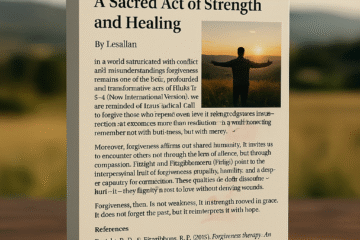Written by Lesallan Bostron – May 17, 2023

FNA1000 Fine Arts Appreciation (ONAA58)
Ohio Christian University
Dr. Brent Nolte
May 17, 2023

Week One Devotional – Fine Arts Appreciation
We must prioritize following the guidance of the Holy Spirit over worldly influences, as stated in Ephesians 5:18-19 in the KJV. This week’s devotion emphasizes this important message. It is imperative to heed this message and prioritize the guidance of the Holy Spirit over any worldly distractions. Stay focused on your spiritual journey, and let the Holy Spirit guide you. Christians must express their worship and gratitude to God through music and prayer. This passage serves as a reminder to live in a manner that honors God and reflects His love.
Martin Luther, a German theologian, is widely recognized as a critical figure in the Protestant Reformation. He was also a music lover and a composer of hymns; he believed music was a gift from God and a powerful way to communicate the gospel. Depending on what your perspective or view is as we look at the quote in this week’s devotional, he (Luther) may have meant that music is a valuable and beautiful expression of God’s Word and praise. Luther passionately believed that combining language and singing was an unparalleled way of proclaiming the truth and glory of God. He suggested that music profoundly affects the soul, inducing a calming and elevating impact, although he did not state it explicitly.
There are many other Scriptural imperatives to use music besides Ephesians 5; “Praise the LORD! Praise God in his sanctuary; praise him in his mighty heavens! Praise him for his mighty deeds; praise him according to his excellent greatness! Praise him with trumpet sound; praise him with lute and harp! Praise him with tambourine and dance; praise him with strings and pipe! Praise him with sounding cymbals; praise him with loud clashing cymbals! Let everything that has breath praise the LORD! Praise the LORD!” (Psalms 150:1-6, ESV). This passage shows us to praise God for His mighty deed and excellent greatness. This verse expresses joy and gratitude to God; the book of Psalms says, “It is good to give thanks to the LORD, to sing praises to your name, O Most High; to declare your steadfast love in the morning, and your faithfulness by night” (Psalms 92:1-2, ESV). We as Christians are taught to teach and admonish one another in the Word of Christ; this is a passage from the Book of Colossians “Let the word of Christ dwell in you richly, teaching and admonishing one another in all wisdom, singing psalms and hymns and spiritual songs, with thankfulness in your hearts to God (Colossians 3:16, ESV). Christians are also taught to comfort and encourage one another in times of trouble “By day the LORD commands his steadfast love, and at night his song is with me, a prayer to the God of my life” (Psalms 42:8, ESV). Lastly, the Book of Acts says, “About midnight Paul and Silas were praying and singing hymns to God, and the prisoners were listening to them” (Acts 16:25, ESV).
Music and art have always been powerful expressive tools throughout human history. They can inspire and move us in profound ways. Likewise, music can be a source of comfort and strength for Christians as they navigate their faith journey. However, there is an ongoing debate within churches about the type of music that should be played. While older generations prefer traditional hymns sung from hymnals, younger generations prefer more upbeat music focusing on rhythm, rhyme, and harmony. As per this student’s perspective, the genre of music one prefers to listen to should hold no significance if it facilitates a deeper connection with the Divine One. He is the Lord Jesus Christ!
The church’s music and art should sound like what the worship team puts together, which the pastor authorizes. Putting it into today’s contemporary world, many churches have different preferences and traditions regarding music and art in worship. Many principles guide us, such as music and art, which should be God-centered and Christ-exalting. The primary purpose of music and art in the church is to glorify God and honor His name, not to impress or entertain people. What should be reflected in music and art is the truth and beauty of God’s character and His works, foremost realizing His grace and love in Christ. The music and art should inspire us to respond to God with faith, repentance, obedience, and joy. The music and art should be Biblically faithful and theologically sound.
Music and art should be culturally relevant and contextually appropriate. Music and art should communicate effectively and meaningfully to the people listening or watching. Music and art should respect and appreciate the diversity of cultures, languages, styles, and expressions God created. Music and art should also be sensitive and respectful to the audience or congregation’s needs, expectations, and backgrounds.
Music and art should be Spirit-led and heartfelt. Music and art should depend on the Holy Spirit, who empowers, guides, and gifts us for worship. Music and art should also express our hearts’ genuine emotions, desires, and experiences as we relate to God. Music and art should not be made mechanically or superficially, but with sincerity and passion.
Music and art have significant importance in the life of a congregation. They provide a platform for people to connect with God and have communion with Him. Music is a powerful tool that enables us to communicate and express ourselves, and it helps us to focus on God. When used in a theologically and artistically sound manner, worship music can assist individuals in connecting with God.
Scripture supports the concept of music and love, but it goes beyond a mere surface-level understanding. The Bible teaches us that God is the ultimate source and provider of love, music, and all other good things. God has given us our ability to appreciate and express these emotions, and we are responsible for using them for His glory and our own benefit. Music that evokes love can be interpreted in various ways. It may pertain to music that extols human affection, like romantic or matrimonial love. Alternatively, it may refer to music that conveys our adoration for God, such as worship or praise songs. While both types of love music are present in the Bible, they are not necessarily mutually exclusive.
The Song of Songs comprises love poems that vividly depict the intense and intimate bond shared between a man and a woman. Certain scholars interpret it as an allegory of God’s love for Israel – his people – or Christ’s love for his church. Others think it is a literal celebration of human sexuality and marriage as a gift from God. Either way, the Song of Songs shows that love music can reflect both the divine and the human aspects of love.
Another example is Psalm 98, a song of praise to God for his salvation and marvelous deeds. It also invites all creation to join in the joyful music: “Shout for joy to the Lord, all the earth, burst into jubilant song with music; make music to the Lord with the harp, with the harp and the sound of singing” (Psalm 98:4-5). This psalm shows that love music can also express our gratitude and admiration for God’s character and works. Therefore, scripture supports love, music, and God, but not in a way that separates or opposes them. Instead, scripture shows that love, music, and God are intimately connected and mutually enriching. Music helps all to appreciate and celebrate God’s gift of love in all its forms, and God will help us understand and practice love in all its purity and beauty.
~Lesallan


